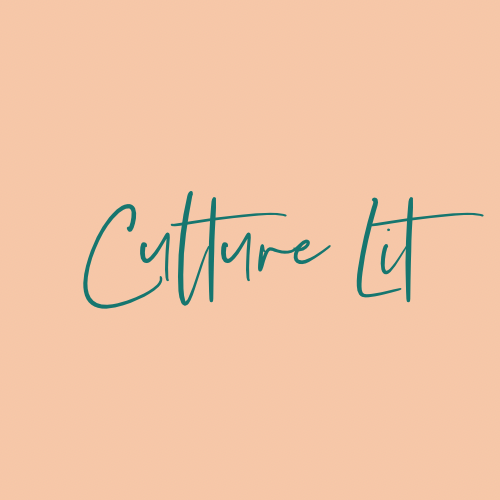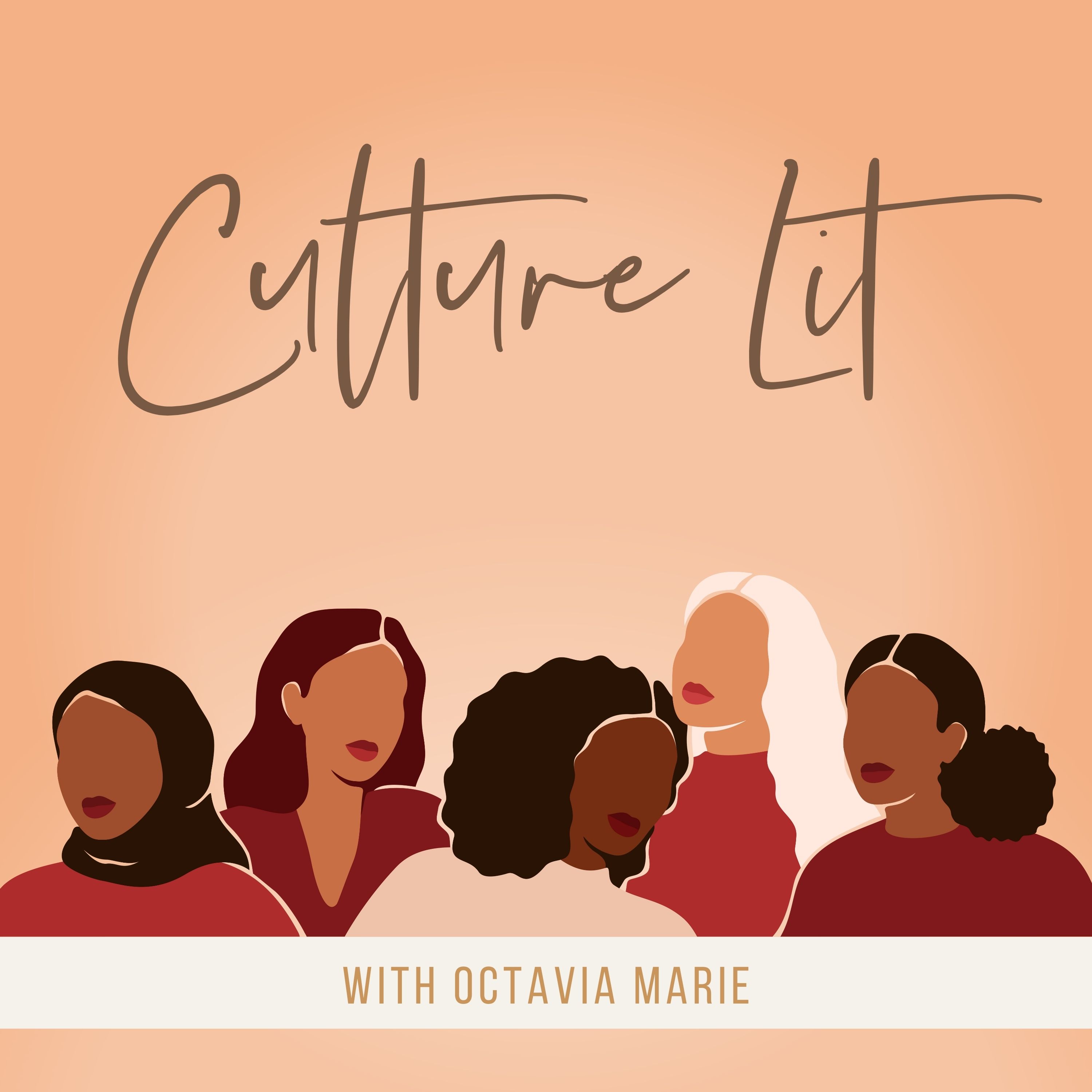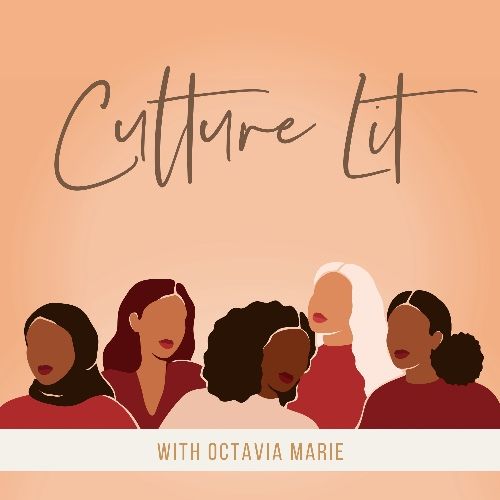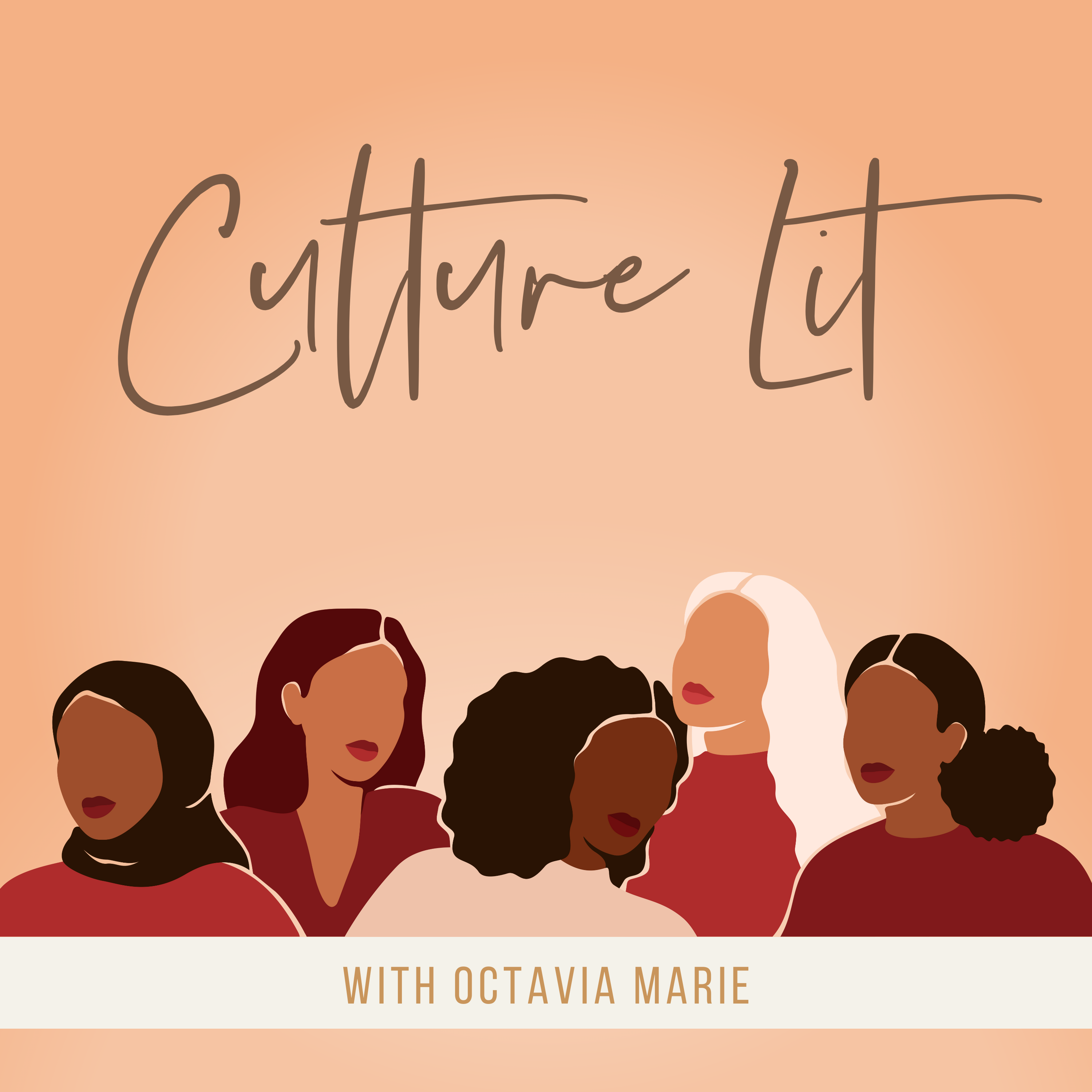Episode 3
3. Love & Ms. Fat Booty: Why Plus-Size Black Heroines Deserve Love Stories Too
Why does it seem to be that women have to have a certain body type, shape, and size to be worthy of love? I grew up with Seventeen magazine and there was no diversity in there. None. Zero. I’ve always been thick or curvy my whole life and because of the layers of socioeconomic dynamics, white supremacy, and unrealistic beauty standards we all grew up with, I got stuck in the idea that there’s only one body type that is deserving of love.
How do romantic narratives explore or influence our ideas of which bodies are desirable or deserving of love or romantic partners? And who decides what those desirable bodies look like? Today’s discussion goes deep into what beauty, desire, and attractiveness really is and why black love is so revolutionary.
I have curated a list of recommendations featuring curvy bodies, chubby bodies, fat bodies, because all bodies are good bodies, and Ms. Fat Booty gets all the happy endings. Find it on Bookshop: https://bookshop.org/shop/CultureLitPodcast
Culture Lit is a community in celebration of black women and black love, and a reminder that black women deserve joy, love, success, second chances, and all the beautiful magic the world has to offer.
Connect on Socials:
on Instagram: https://www.instagram.com/becomingoctaviamarie/
on Twitter: https://www.twitter.com/xooctaviamarie
Attribution Link: A Podcast Launch Bestie Production
Mentioned in this episode:
You can find all the books I've reviewed in this podcast in my Bookshop! Visit https://bookshop.org/shop/CultureLitPodcast to get your copy!
Transcript
recently I was scrolling through the socials and happened upon a
Octavia Marie:thread comparing two plus size models.
Octavia Marie:The comments were about on par to what I'd expect of the comments anytime the
Octavia Marie:bodies of black women are discussed.
Octavia Marie:I wasn't very surprised by what I read.
Octavia Marie:Some comments were disguised as fake concern for health of the models.
Octavia Marie:Of course, some colors and comments were thrown in for shits and giggles.
Octavia Marie:Then the comments turned to why neither model would get a man until they lost
Octavia Marie:some weight, which again, didn't surprise.
Octavia Marie:And this led me here.
Octavia Marie:How do romantic narratives explore or influence our ideas of which
Octavia Marie:bodies are desirable or deserving of love or romantic partners?
Octavia Marie:how individuals must produce desirable bodies to create quote unquote
Octavia Marie:value in a romantic relationship.
Octavia Marie:And who decides what those desirable bodies look like?
Octavia Marie:What lens, especially when you looking at the bodies of black women.
Octavia Marie:And let's be clear.
Octavia Marie:Whiteness and white supremacy plays a role here too.
Octavia Marie:Even when the desirability is being discussed by our black hemp folk.
Octavia Marie:And then there's honestly even a socioeconomic dynamic at play here.
Octavia Marie:Do you know your place?
Octavia Marie:Do you know your role in this culture?
Octavia Marie:And are you adhering to the norms of your identity and how you fit into this S.
Octavia Marie:, there are so many lanes to go down here, but let's just niche it on
Octavia Marie:down and talk about our bodies and how that plays into romantic love.
Octavia Marie:I've gone around and around about what message I wanted to get across.
Octavia Marie:We hit on my love of romance novels, and even in some of my favorite books
Octavia Marie:by my favorite authors, we still get caught up in what bodies recur
Octavia Marie:the most, or a representative of D.
Octavia Marie:When we think about beauty standards and we think about the dominant idea of beauty
Octavia Marie:standards, I think about when I was a teenager and I used to read 17 Magazine
Octavia Marie:and see the models on the cover and inside there wasn't a black teen equivalent.
Octavia Marie:I think the closest might have been right on magazine.
Octavia Marie:What were teenage girls supposed to look like?
Octavia Marie:Or better yet, what did black teenage girls look.
Octavia Marie:, they had us believing they were supposed to look like tall, white, thin,
Octavia Marie:young, beautiful, and probably blonde.
Octavia Marie:So suffice it to say black teen girls were questioning their bodies long
Octavia Marie:before the body positivity movement.
Octavia Marie:We never questioned where this idea came from, though there was absolutely
Octavia Marie:no diversity in those magazines, especially no body diversity.
Octavia Marie:. I'm a woman that is thick, black, and 50 ish.
Octavia Marie:Mind your business.
Octavia Marie:I've dealt with these ideas of my body and what it should look like during
Octavia Marie:my life as a thick or curvy woman.
Octavia Marie:I've been different sizes throughout my entire adult life, but I've
Octavia Marie:mainly been curvy and thick.
Octavia Marie:I think about who deserves love and again, what we've been told about love.
Octavia Marie:If we go back, I really want to kick my 16 year old self for having spent
Octavia Marie:my tween years reading all these different magazines and then thinking
Octavia Marie:if you just lost those 10 pounds, that guy would be really interested in you.
Octavia Marie:And here we are in 2023, speaking that same trash to our women and girls.
Octavia Marie:we're focusing on the physical aspect of what's considered
Octavia Marie:attractive and what's not.
Octavia Marie:For me, the big old booty wasn't always a desired body.
Octavia Marie:Now women are paying thousands of dollars for the same body.
Octavia Marie:I shunned in my teen years.
Octavia Marie:I'm not gonna lie, the body talk messed with my mind in my twenties.
Octavia Marie:Then I finally decided they're gonna get whatever my body's given.
Octavia Marie:Enough is enough.
Octavia Marie:My thing is sting and they gonna get all of this.
Octavia Marie:I didn't start reading romance until my early twenties.
Octavia Marie:I've been a dedicated romance reader for decades now, but I remember my favorites
Octavia Marie:from the start of my romance reading.
Octavia Marie:I'm not gonna then shame anyone because that was a long time ago.
Octavia Marie:And authors have come a very long way in diversifying their leading ladies.
Octavia Marie:But this traditional romantic lead, she is a 23 year old girl who's tall
Octavia Marie:and lean and she's Every guy's desire.
Octavia Marie:I've read those books.
Octavia Marie:There's still quite a few of those books that I really enjoy,
Octavia Marie:but I don't identify with them.
Octavia Marie:When I seek out romance, there are some books that I just won't read.
Octavia Marie:People continually advocate for representation, not just ethnic
Octavia Marie:representation, but body diversity too.
Octavia Marie:I don't want to read books where the main character is talking about
Octavia Marie:dieting so she can lose weight to capture the hero's attention.
Octavia Marie:No.
Octavia Marie:Nope, not interested.
Octavia Marie:There's a book that came out last year titled Savvy Sheldon Feels Good as Hell.
Octavia Marie:I was really looking forward to reading this book.
Octavia Marie:The Cover had a curvy black woman with natural wild hair.
Octavia Marie:But as I started to read the first pages of the book, I felt the story going in
Octavia Marie:that direction, and I was so disappointed.
Octavia Marie:Almost put the book down.
Octavia Marie:There were some great parts in the book and some of the book focused on
Octavia Marie:a revenge body theme after breaking up with her boyfriend who left her
Octavia Marie:with cruel words about her body.
Octavia Marie:However, I kept with it because I really liked the character Sheldon, and it
Octavia Marie:ended up being one of my favorite books.
Octavia Marie:I think about what are we telling women is desirable and what do they need
Octavia Marie:to do to themselves to be desirable?
Octavia Marie:And this is inclusive of all people who identify as a woman.
Octavia Marie:When we get down to it, romance is a written art, right?
Octavia Marie:People are creative and they come up with these stories and they want us to.
Octavia Marie:But there's also the capitalism behind selling books.
Octavia Marie:Early in my career journey, I was a romance copy editor, so I've
Octavia Marie:edited a few of these romance.
Octavia Marie:, there's all these craft books about what a romance is supposed to do, and
Octavia Marie:we all know about the trop and we all know about the tropes and the rhythm
Octavia Marie:of books and the cheat sheets and all that, but what's going to sell?
Octavia Marie:Are you gonna sell a book where a 41 year old fat woman finds
Octavia Marie:love without self-loathing?
Octavia Marie:, when we talk about writing black or brown romance, all of these
Octavia Marie:different things, what it comes down to is what's going to sell, right?
Octavia Marie:The perpetuation of this idea, not just of love and being worthy of love.
Octavia Marie:Have you worked hard enough to deserve this love?
Octavia Marie:I think that every single person is deserving of love, and that's
Octavia Marie:what's angered me about the comments on this woman's post.
Octavia Marie:Why is she not deserving of love and why do you think she has to
Octavia Marie:be a certain body to be worthy of?
Octavia Marie:, we need to throw that away with all the other trash ideas floating around in 2023.
Octavia Marie:I can't believe some of this bullshit.
Octavia Marie:One does not need to do anything, attain anything to be worthy of love.
Octavia Marie:There are probably things individuals do to have successful relationships, right?
Octavia Marie:We're all in control of our behavior.
Octavia Marie:and partners are also in charge of their behavior, but
Octavia Marie:everyone is deserving of love.
Octavia Marie:I think the problem is that when we see the same archetype recurring
Octavia Marie:over and over again, it's the vast majority of representation.
Octavia Marie:However, it's a much smaller percentage of actual representation, like in real life.
Octavia Marie:It starts to reinforce those ideas that certain people are
Octavia Marie:desirable, certain bodies are d.
Octavia Marie:And I think it's really important when talking specifically about body
Octavia Marie:positivity, is to acknowledge the appropriation of body positivity by
Octavia Marie:white feminism, consumer feminism.
Octavia Marie:When we think about the reasons why people in stories say they
Octavia Marie:desire something, the reasons why are almost just important as what.
Octavia Marie:I think the lens is very important as we start to talk about bodies,
Octavia Marie:and particularly in text, and that can conclude a literal text,
Octavia Marie:like a book or a film or a TV show.
Octavia Marie:That the way we talk about things sometimes they may be representing their
Octavia Marie:body that does not conform entirely into that European beauty standard,
Octavia Marie:but still reinforces the exact same ideology because all they do
Octavia Marie:is switch what is included in what should be accepted as beautiful.
Octavia Marie:Bell Hooks was a voracious reader of romance novels, and in her
Octavia Marie:essay, black is a Woman's Color.
Octavia Marie:She begins with Good.
Octavia Marie:. That's the expression we all know.
Octavia Marie:It.
Octavia Marie:Begin to hear when we were small children, when we were sitting
Octavia Marie:between the legs of mothers and sisters, getting our hair combed.
Octavia Marie:Good hair is hair that is not kinky.
Octavia Marie:Hair that does not feel like balls of steel, wool, hair that does not take
Octavia Marie:hours to comb hair, that does not need tons of grease to untangle hair.
Octavia Marie:That is long.
Octavia Marie:Real good hair is straight.
Octavia Marie:Hair.
Octavia Marie:Hair like white folks'.
Octavia Marie:. We pretend that the standards we measure are beauty by are our own invention.
Octavia Marie:that it is a question of time and money that lead us to make distinctions
Octavia Marie:between good hair and bad hair.
Octavia Marie:Getting our hair pressed is an important ritual.
Octavia Marie:It is not a sign of our longing to be white.
Octavia Marie:It is not a sign of our quest to be beautiful.
Octavia Marie:We are girls.
Octavia Marie:It is a sign of our desire to be women, and I just thought that this distinctly
Octavia Marie:captures how we convince ourselves under that ideology to believe that these goals
Octavia Marie:are our goals, that they have nothing to do with these other ideologies, that
Octavia Marie:this is just what we are choosing to.
Octavia Marie:Also, it encapsulates that project that we undertake informing our bodies to
Octavia Marie:be, to fit a certain standard and not to question how we formed that idea.
Octavia Marie:To begin with.
Octavia Marie:In my teen years, I was such an activist and was so against romantic notions
Octavia Marie:from my young teen understanding of feminism, but none of those
Octavia Marie:women were from an adult viewpoint.
Octavia Marie:They weren't my age.
Octavia Marie:, I hear so many women my a saying, I don't wanna read about 23 year olds,
Octavia Marie:and I absolutely don't wanna read about skinny 23 year olds all the time.
Octavia Marie:I think as teenage black girls, we needed that and didn't always get it.
Octavia Marie:And so in the essay by Bell Hooks, I think about why it's so important to see black
Octavia Marie:beauty and not just represented in ads.
Octavia Marie:There's a whole discussion on lighter skin and hair, and that's what we see in ads.
Octavia Marie:That's who we see model.
Octavia Marie:. But when we think about women who have forcey hair getting represented in ads,
Octavia Marie:women who deal with this pigmentation women of all sizes and shapes and shades.
Octavia Marie:I think that's what young girls need to see.
Octavia Marie:It's also why I believe black love is so revolutionary and we
Octavia Marie:need to see and read more about black women and the idea of love.
Octavia Marie:Jessica Pride released an anthology last year titled Black Love Matters
Octavia Marie:that showcases personal essays that reflect how black love has been depicted
Octavia Marie:in media from social justice, the publishing industry to desirability,
Octavia Marie:and it's a must for those who want to engage with the concept of black
Octavia Marie:love as a form of liberation and self.
Octavia Marie:from the moment you are born, there are these expectations by
Octavia Marie:who you should be as a woman.
Octavia Marie:My bestie and I talk a lot about growing up with a mom who constantly talked
Octavia Marie:about dieting or being on a diet, always trying some diet shake or exercising.
Octavia Marie:If you weren't working out, you weren't losing weight.
Octavia Marie:If you weren't drinking these shakes and eating bland chicken for
Octavia Marie:dinner, you weren't losing weight.
Octavia Marie:All in the pursuit of losing.
Octavia Marie:because it was what was tied to self-worth, and that was passed on to me.
Octavia Marie:So when we think about who deserves success, who deserves love, not
Octavia Marie:the people who can't control themselves that eat too much.
Octavia Marie:There's an assumption that fat people are lesser than, do not have
Octavia Marie:control, and therefore are unworthy of love as they are right now.
Octavia Marie:But here's the thing, it's what we're told.
Octavia Marie:. It's how we are raised.
Octavia Marie:And when it comes to body size, the goal there is to be small.
Octavia Marie:So the behavior is to achieve a particular goal that when you actually
Octavia Marie:think about the goal, you're like, why is it better to be smaller or
Octavia Marie:to be a particular prescribed size?
Octavia Marie:Right?
Octavia Marie:Like, why is that the goal?
Octavia Marie:. As I've worked towards having a healthier relationship with my body, I
Octavia Marie:actually really wanted to resist that.
Octavia Marie:Why do I have to be smaller?
Octavia Marie:Why do I have to do particular things to adhere to a beauty standard?
Octavia Marie:I don't have to do it for those reasons.
Octavia Marie:But there are other reasons to take a walk.
Octavia Marie:If you change the goal of I need to punish my body for eating something by doing this
Octavia Marie:with the goal of getting smaller, that's a very different frame of mind from if I pay
Octavia Marie:attention to my body, when I take a walk, I feel better, my mind is more clear.
Octavia Marie:When I include some physical activity in my day, it becomes about the framing.
Octavia Marie:We've all struggled with the same thing and connecting exercise with weight loss
Octavia Marie:and doing exercise for weight loss is again, how it's been framed for so long.
Octavia Marie:I will say though, that it feels like things are changing.
Octavia Marie:That actually comes back to the idea of romance as a marketplace where the
Octavia Marie:illusion of all the choice actually turns us into consumers of romantic
Octavia Marie:partners and as producers of ourselves as product in that romantic marketplace.
Octavia Marie:And so that too really enforces this idea.
Octavia Marie:We need to make ourselves as valuable as possible in this romantic marketplace.
Octavia Marie:And when I see blacks finally getting it and writing books about black women
Octavia Marie:and love, that deconstructs the beauty standard for women in terms of size,
Octavia Marie:the women may not be conventionally attractive by every other aspect.
Octavia Marie:Like she's dark skin, she's able bodied, she's upper middle class.
Octavia Marie:Her body is shaped in a way that I think is considered to be more
Octavia Marie:conventionally attractive, like big boobs.
Octavia Marie:It feels we're really breaking down body stereotypes and
Octavia Marie:expectations for women here, but are we doing the same for men also?
Octavia Marie:Are we reinforcing the value of certain male beauty standards in this story?
Octavia Marie:There's a number of books that I've read over the past few years I'd say, that
Octavia Marie:really have shown that representation, both on the male side and female.
Octavia Marie:If the narrative focus exclusively on like the one, you can have one flaw, and
Octavia Marie:God forbid, that it goes against the European beauty standards when thinking
Octavia Marie:about that sort of intersectionality, you are a fat black woman who is also
Octavia Marie:socioeconomically less privileged.
Octavia Marie:Is that too much?
Octavia Marie:Can we not handle that in our romance?
Octavia Marie:and I don't wanna just talk about romance novel cuz I think that this really
Octavia Marie:extends to all romantic narratives, like writing a script with a film or like
Octavia Marie:creating a character in a TV show or casting actors, literal people in visual
Octavia Marie:representation of these fictional stories.
Octavia Marie:even in advertisements, usually there's a narrative to an advertisement.
Octavia Marie:And so if the casting of people is, okay, great, we're gonna do the Dove ad
Octavia Marie:and we are going to, we've got our Asian woman, we've got our size, whatever.
Octavia Marie:We've got some stretch marks and itself becomes problematic as.
Octavia Marie:It becomes like a checklist.
Octavia Marie:I've been paying a little bit more attention to this as I read,
Octavia Marie:because books that I really enjoy by authors like Talia Hibbert,
Octavia Marie:Rebecca Weatherspoon, Jasmine Guie.
Octavia Marie:The depth is there.
Octavia Marie:The depth is there.
Octavia Marie:So what are my choices?
Octavia Marie:What kind of book would be either sold or self-published?
Octavia Marie:Who would write the story?
Octavia Marie:We think about feminism and romance.
Octavia Marie:and I know you've had these conversations before.
Octavia Marie:What is the limit?
Octavia Marie:What is allowable?
Octavia Marie:What is palatable?
Octavia Marie:How far can you go?
Octavia Marie:I struggle in talking about this regarding romantic novels, but if you think about
Octavia Marie:movies and you think about TV shows, it comes down to what's going to sell
Octavia Marie:and what are people going to watch.
Octavia Marie:Is the investment worth it?
Octavia Marie:Consumerism isn't about feeding the people what they want.
Octavia Marie:It's about making money.
Octavia Marie:It's about making profit and selling people.
Octavia Marie:Like I love that.
Octavia Marie:That's the ethics of marketing.
Octavia Marie:It's are you truly giving people what they want and need, or are
Octavia Marie:you making people go get interest loans for something they don't
Octavia Marie:probably need, but also can't afford?
Octavia Marie:And then, so what's your end game?
Octavia Marie:What is the goal of capitalism?
Octavia Marie:It's making money.
Octavia Marie:Their incentive is to sell you something.
Octavia Marie:They literally don't have a job if they can't sell the manuscript.
Octavia Marie:So they are then dependent on this preconceived idea about what sells.
Octavia Marie:And this reminds me of something I posted on Twitter recently about
Octavia Marie:this idea of when publishers say something doesn't have a market, what
Octavia Marie:they usually mean is either they.
Octavia Marie:Ever acquired a thing like this so they have no sales data, or they have acquired
Octavia Marie:something like this that has some element in common with this, and they chalked up
Octavia Marie:its lack of success to this one thing.
Octavia Marie:Right or wrong.
Octavia Marie:They only have one thing like it and they're painting all of this token
Octavia Marie:representation of like, we tried a book with a fat character once
Octavia Marie:and it didn't do well, or we're not gonna pay attention to the fact that
Octavia Marie:we did market the book effectively.
Octavia Marie:We didn't put any budget behind it that this particular story maybe
Octavia Marie:didn't resonate with people as well as another story was a Fat character.
Octavia Marie:You know how it goes.
Octavia Marie:The list goes.
Octavia Marie:. So that's my take for today.
Octavia Marie:My rent is over.
Octavia Marie:If you're looking for some great reads, I've included a link for
Octavia Marie:recommendations featuring curvy bodies, chubby bodies, fat bodies,
Octavia Marie:because all bodies are good bodies.
Octavia Marie:Romances, where Miss Fat Booty gets all the happy endings, all of them.



